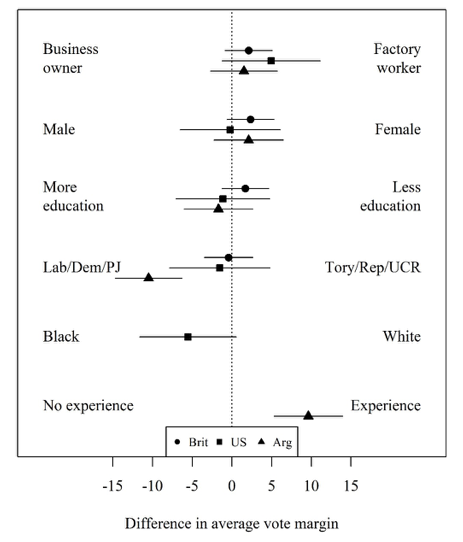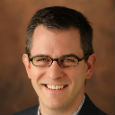The rich get elected – but it’s not because voters necessarily prefer them
We elect politicians who are far better-off than ourselves – in Europe, those who come from blue-collar backgrounds make up only a tenth of national parliaments. Is this because voters favour the rich? A new study by Nicholas Carnes and Noam Lupu suggests they are slightly more likely to opt for working-class candidates over business owners. Blue-collar candidates just don’t get onto the ballot paper in the first place.

Photo: Robert Sheie via a CC-BY 2.0 licence
Why are democratically-elected politicians around the world so much richer than the people they represent?
One of the most striking constants across electoral democracies is that they all tend to elect leaders who are vastly better off than the citizens they represent. In both developing and advanced countries, elected officials tend to be far wealthier, more educated, and more likely to come from white-collar jobs than the citizens who elect them. Here in the US, working-class citizens—people employed in manual labour, service industry, clerical, or informal sector jobs—make up over half of the labour force, but the typical member of the US Congress spent less than 2 percent of his or her career beforehand in the kinds of working-class jobs that most Americans go to every day. The story is essentially the same in every country for which data exist. Across Latin American democracies, workers make up between 60 and 90 percent of the general public, but legislators from those occupations make up just 5 to 25 percent of national legislatures. In Europe, blue-collar workers make up large proportions of the electorate but have rarely made up more than 10 percent of national legislatures.
These inequalities in who governs seem to have huge consequences for policy. Just as the shortage of women or racial and ethnic minorities in office can affect policy outcomes on issues related to gender and race, the shortage of lower-income and working-class politicians—who tend to be more leftist on economic issues in most countries—appears to bias policy on issues like wage supports, taxation, and social welfare towards the more conservative positions typically favoured by affluent citizens.
Why, then, are politicians so often drawn from the top strata of society? One idea that often surfaces during elections is that government by the rich must simply be the will of the people. When “voters . . . elect wealthy politicos,” the story goes, it’s because they “want a mix of personality and power, but only if they come with a pedigree and bank account to match.” In political systems where voters are free to choose just about anyone to hold office, if affluent people are numerically overrepresented in public office, isn’t that just an expression of what the voters want?
We recently put this idea to the test in a series of studies published last December in the American Political Science Review. Up front, we had serious concerns about the notion that voters prefer privileged politicians. There are lots of other social and political forces that could be behind the global phenomenon of government by the rich—biases in elite recruitment, differences in political ambition, resources barriers that screen out the less fortunate, and so on. There are also lots of reasons to doubt that voters really prefer to elect the wealthy: after all, candidates often try to downplay their privileged economic circumstances—they “run from their wealth,” as observers often say here in the U.S.
To see whether voters are really behind the global phenomenon of government by the rich, in 2014 and 2015 we conducted survey experiments in the US, Great Britain, and Argentina. In all three countries—like in most democracies—working-class people almost never go on to become politicians. In most other ways, however, these three countries differ dramatically: their democratic systems run the gamut from old to new, presidential to parliamentary, majoritarian to proportional, and two-party to multiparty.
In our experiments, we showed voters in each country short vignettes about two hypothetical candidates, then asked which one they would be more likely to vote for (and a few follow-up questions, including which candidate they thought was more competent, more likely to understand the voter’s concerns, and more ideologically leftist).
Unbeknownst to the voters taking the survey, each candidate’s personal characteristics were generated at random—their occupation (blue-collar worker or business owner), gender, education level, race, and political experience were all assigned at random.
Like studies of actual elections, these experiments didn’t find a shred of evidence that voters prefer more affluent politicians. The figure below shows the effect of occupation and other variables on the share of votes each candidate received. If anything, working-class candidates were slightly more popular than business owners, not less so.

Figure 1: Candidate Characteristics and Voting in Britain, the US, and Argentina.
Sources: 2015 British Election Study, 2015 Cooperative Congressional Election Study, 2015 Argentina Panel Election Study.
Notes: Values represent the difference in respondents’ propensity for supporting a hypothetical candidate based on the candidate’s occupation, gender, education, party, race (US only), and experience (Argentina only). Lines represent the 95% confidence interval estimated using clustered standard errors clustered by unique election. Estimates are based on ordinary least squares regression models reported in Table A1 in the online appendix. N = 7,558 (Britain), 1,356 (US), and 2,000 (Argentina).
We did, however, find significant differences in some views. Voters regarded working-class candidates as slightly less competent, but also slightly more likely to understand the problems facing people like themselves. And in the end, the two seemed to cancel out: the average citizen was just as likely to say they would cast their vote for a candidate regardless of whether the candidate was a blue-collar worker or a white-collar professional.
Simply put, voters don’t seem to be responsible for government by the rich in advanced democracies. To the contrary, voters in the US, the UK, and Argentina seem to like working-class candidates just fine. They just seldom get the chance to vote for them, however. Whatever barrier is keeping working-class people out of office is happening long before Election Day.
Most elections around the world won’t feature candidates from the working-class jobs that make up the backbone of the global economy. But that probably doesn’t have anything to do with the will of the people. By the time most voters get to the polls—whether they’re in the US, Argentina, or most other democracies—their only options are affluent candidates. And that’s a far cry from a popular mandate.
This post represents the views of the authors and not those of Democratic Audit.

 Nicholas Carnes (left) is assistant professor of public policy and political science at Duke University and the author of “White-Collar Government: The Hidden Role of Class Economic Policymaking” (University of Chicago Press, 2013).
Nicholas Carnes (left) is assistant professor of public policy and political science at Duke University and the author of “White-Collar Government: The Hidden Role of Class Economic Policymaking” (University of Chicago Press, 2013).
Noam Lupu is associate professor of political science at Vanderbilt University and the author of “Party Brands in Crisis: Partisanship, Brand Dilution, and the Breakdown of Political Parties in Latin America” (Cambridge University Press, 2016).





 Democratic Audit's core funding is provided by the Joseph Rowntree Charitable Trust. Additional funding is provided by the London School of Economics.
Democratic Audit's core funding is provided by the Joseph Rowntree Charitable Trust. Additional funding is provided by the London School of Economics.
Up to a point.
There is really a simple reason why employees/workers outside of politics do not take part in politics – people who are better off are able to carve out the time to take part if they wish to. A worker in a factory is not allowed time out to campaign and ‘play at politics’ (on the chance that he might get elected in 5 or 6 years time)…but a lawyer, for example, CAN choose to devote time over a period without being sacked. This is not to say that the lawyer is somehow free to do exactly what he or she chooses – if successful they will be very busy with their profession …but they have options on time for political meetings/hustings etc.
How on earth could any real bona fide ‘worker’ have stood as a candidate in the 2 by-elections happening today in the UK? Stoke and Copeland. The need for a month (and really, more) out and totally focussed on the campaign day and night…better off people can do this, your worker gets the sack or is quietly got rid of.
But of course in the UK, one thing constantly commented upon is the fact that successful lawyers, businesspeople etc are now increasingly ignoring the demands made by public life (specially at its early stages) and scornful of it, they call it ‘a mug’s game’. “All those boring meetings and committees and need to take time out” – it seems that while workers are physically unable to take the time off, increasingly the successful professional who CAN, is not inclined to.
This is why, in the UK now, so many aspiring politicians start off by working for other politicians as researchers etc…and are then allowed the time by the system to pursue their dreams of elected office. Hence the common cry that “there are not ENOUGH successful people in their own right standing for office” any more…”they started in politics with their degree and have never known anything else”…
It is, btw, the same kind of argument as we now hear about acting, ably made by Helen Mirren – in the UK they are all Sloaney chaps and chappesses who went to public school. Get all the British talent in the same place in a room at the Academy Awards, throw a brick up in the air and it’ll land on someone who was at Eton. Parents have the time and money, the kid has the breathing space, but as life is ever more pressured with ever less free time for the average person, the employee does not have that time any more to pursue. Simple really.